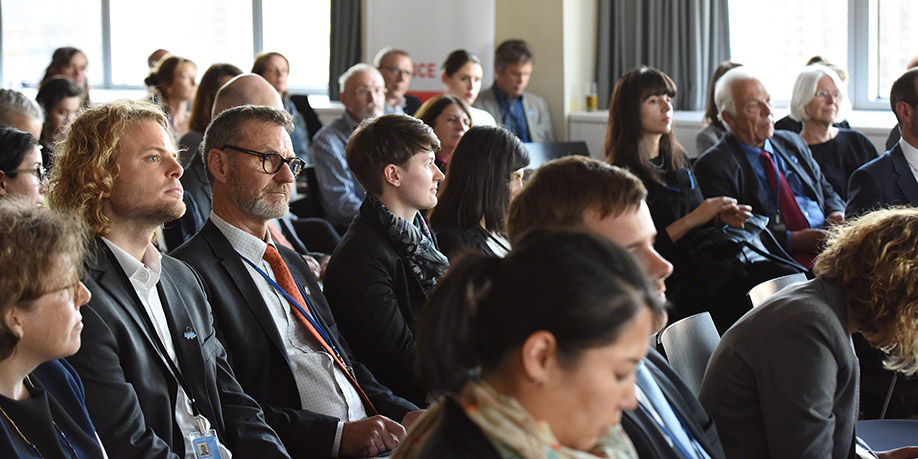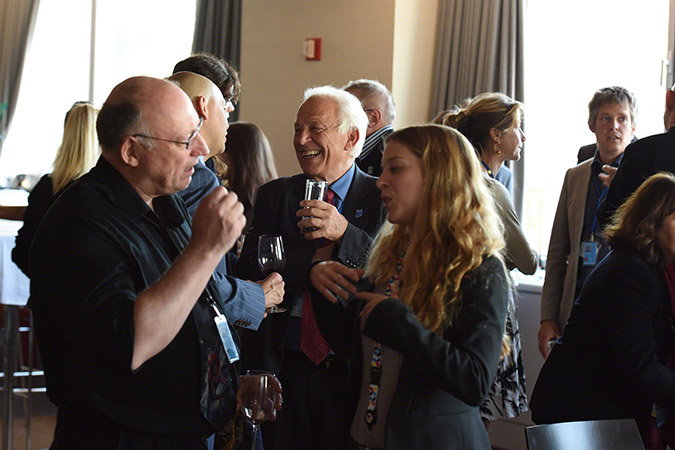Summary
The following special event was covered by ENBOTS on Wednesday, 7 June 2017:
The following side events were covered by ENBOTS on Wednesday, 7 June 2017:
- Launch of the Blue Action Fund
- Second Annual Global Multi-stakeholder SIDS Partnership Dialogue
- Joining Hands to Help Achieve SDGs 6 and 14 – a Win-Win for Freshwater and Oceans
- Co-Designing Game-Changing Ocean Solutions for Sustainable Development
- Solutions to Combat Marine Litter
IISD Reporting Services, through its Earth Negotiations Bulletin on the Side (ENBOTS) Meeting Coverage, is providing daily web coverage of selected side events at the Ocean Conference.
Photos by IISD/ENBOTS | Francis DejonFor photo reprint permissions, please follow instructions at our Attribution Regulations for Meeting Photo Usage Page
Launch of the Blue Action Fund
Presented by the Blue Action Fund, the German Federal Ministry for Economic Cooperation and Development - BMZ, Government Offices of Sweden, and the KfW Development Bank
Opening the event, Harald Braun, Permanent Representative of Germany to the UN, saluted the launch of the Blue Action Fund by the Government of Germany and the German national bank (KfW Development Bank).
Anote Tong, former president of Kiribati, announced that Kiribati closed 200,000 km2 to fishing activities in 2015 and said the Blue Action Fund is essential to filling the financing gap in safeguarding marine biodiversity.
Tania Rödiger-Vorwerk, BMZ, said the Blue Action Fund will step up action for the implementation of SDG 14, with an initial fund of €24 million. She explained that the Initiative will support national and international non-governmental organizations (NGOs) in their efforts to conserve oceans and coastlines, by promoting: the safeguarding of marine biodiversity, through creating new protected areas and improving the management of existing ones; and the sustainable use of marine biodiversity in fisheries, aquaculture and tourism.
Isabella Lövin, Minister for International Development Cooperation and Climate, and Deputy Prime Minister, Sweden., noted that by 2020, 60% of the world’s population will live in coastal areas. She said that by forming a network of marine protected areas (MPAs), the Blue Action Fund will enable the protection of migratory species. Lövin further stressed the need for working together with local communities, and announced that Sweden will contribute US$ 5.4 million to the Blue Action Fund.
Stephan Opitz, KfW Development Bank, explained that the Blue Action Fund selection process for NGOs was designed to be lean and competitive. He said the Initiative will fund projects that: have an integrated approach, not only setting MPAs but also involving communities in the sustainable management of marine biodiversity; have a regional focus; and be scalable and transformative. Opitz added that projects will initially be funded with €1-3 million and NGOs are expected to contribute 25% of the necessary funding for their realization.
In a panel discussion moderated by Carl Gustaf Lundin, IUCN, John Tanzer, WWF International, stressed the importance of regional networks. Greg Stone, Conservation International, spoke about the importance of setting long-term principles for MPAs. Gerald Miles, RARE, stressed the need to embed these sustainable use principles in social norms and ensure local communities’ buy in.
Providing closing remarks, Cristián Samper, President, Wildlife Conservation Society, stressed the need for sustained investment to ensure that the partnerships created between governments, NGOs and local communities will have the desired results.
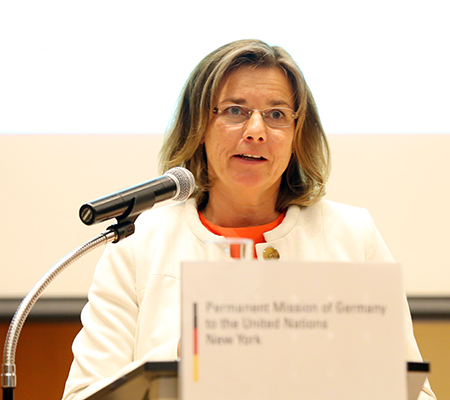
Isabella Lövin, Minister for International Development Cooperation and Climate, and Deputy Prime Minister, Sweden., announced that Sweden will contribute US$ 5.4 million to the Blue Action Fund.
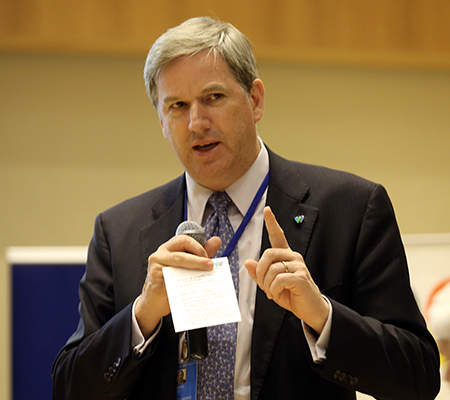
Cristián Samper, President of Wildlife Conservation Society, stressed the need for sustained long-term investment.
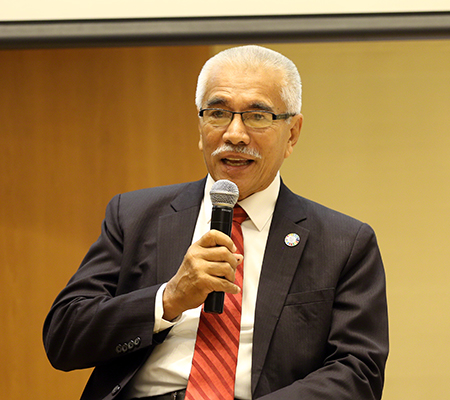
Anote Tong, former president of Kiribati, said the Blue Action Fund is essential to filling the financing gap in safeguarding marine biodiversity.
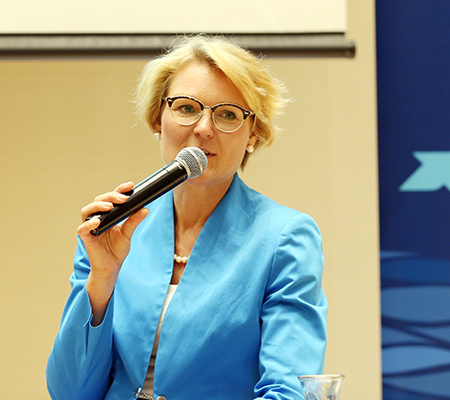
Tania Rödiger-Vorwerk, BMZ, said the Blue Action Fund will step up action for the implementation of the SDG 14 with an initial fund of €24 million.
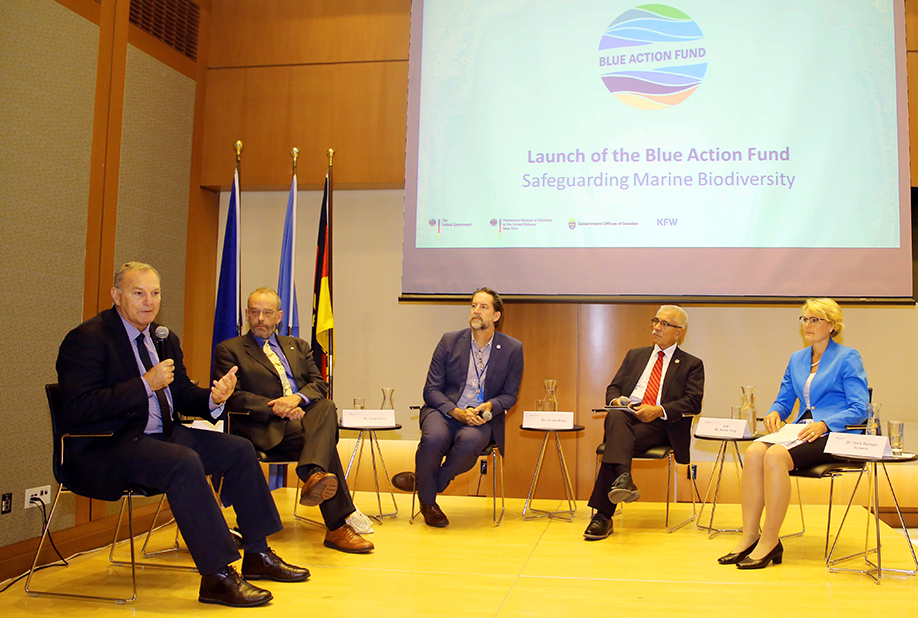
Panel (L-R):
Gerald Miles, RARE;
Greg Stone, Conservation International;
John Tanzer, WWF International;
Anote Tong, former president of Kiribati; and
Tania Rödiger-Vorwerk, BMZ.
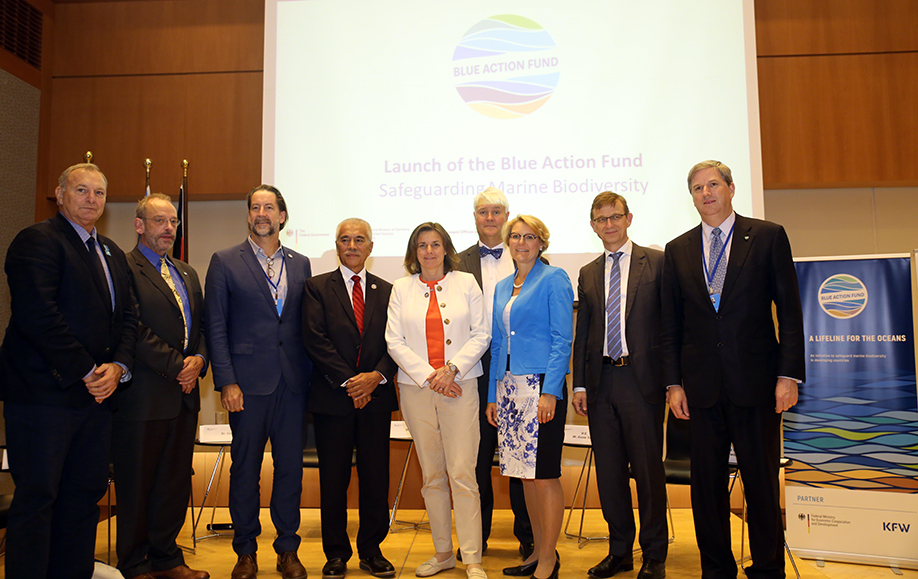
Contacts:
- PERSON_NAME (Moderator Coordinator) | EMAIL_ADDRESS
- PERSON_NAME (Moderator Coordinator) | EMAIL_ADDRESS
- PERSON_NAME (Moderator Coordinator) | EMAIL_ADDRESS
- Ola Göransson (Sustainable Development Officer & Partnerships Coordinator, Division for Sustainable Development, UN DESA) | goranssono@un.org
- Shifaana Thowfeequ (Programme Management Officer, UN-OHRLLS) | thowfeequ@un.org
- Birgitta Liss Lymer (Stockholm International Water Institute) | birgitta.liss.lymer@siwi.org
- Aulani Wilhelm (Moderator) | awilhelm@conservation.org
- Jens-Michael Bopp (Permanent Mission of Germany to the UN) | jens-michael.bopp@diplo.de
More Information:
Second Annual Global Multi-stakeholder SIDS Partnership Dialogue
Presented by the UN Department of Economic and Social Affairs (DESA) and UN-OHRLLS, in consultation with the Steering Committee on Partnerships for SIDS, co-chaired by the Governments of the Maldives and Italy
Sebastiano Cardi, Permanent Representative of Italy to the UN, opened the event, saying this second SIDS Partnership Dialogue aims to galvanize voluntary commitments for the implementation of SDG 14 among the SIDS partnership community.
In his keynote address, Peter Thomson, President of the UN General Assembly, stressed the relevance of welcoming the SIDS Dialogue at the Ocean Conference, underscoring that partnerships for SIDS are strongly Ocean-related. He stated that SDG 14 was created by SIDS, overcoming strong opposition.
Mohamed Shainee, Minister of Fisheries and Agriculture, Maldives, highlighted that the 2014 Samoa Pathway, the blueprint for achieving sustainable development in SIDS, requires more partnerships.
Silvia Velo, Italy, stressed her country’s strong partnership with SIDS and the durable and transparent relationships between equal partners, currently in place in the Samoa Pathway.
Wu Hongbo, Under-Secretary-General, DESA, remarked that the SIDS Partnership Framework is open to all member states, UN agencies and stakeholders, and stressed that dialogue five of the Ocean Conference targets SIDS specifically.
Fekitamoeloa Katoa ‘Utoikamanu, High Representative for the Least Developed Countries, Landlocked Developing Countries and Small Island Developing States, emphasized OHRLLS actions on: developing public-private partnerships for SIDS; and strategizing on how the UN system can best coordinate on SIDS issues.
A dialogue followed on the theme “Partnering with SIDS and Oceans,” moderated by Ahmed Sareer, Permanent Representative of Maldives to the UN.
Henry Puna, Prime Minister, Cook Islands, announced that his country will establish a two million km2 marine park and a new 300, 000 km2 marine reserve where no commercial activity is allowed. He stressed the need to innovate for financing the costs of such actions and ensure their success.
Concetta Fierravanti-Wells, Minister for International Development and Pacific, Australia, highlighted the importance of defining clear Ocean jurisdiction and stressed his country’s support to Pacific SIDS in this matter under the UN Convention on the Law of the Sea (UNCLOS). She announced a AUS $2 million to the SIDS Partnership Framework for the next two years.
Karen Ellemann, Minister for Equal Opportunities and Nordic Cooperation, Denmark, shared examples of her country’s support to SIDS, including: the “Mangroves for the Future” project; a climate change adaptation project; and support to the Green Climate Fund.
Tone Skogen, State Secretary, Norway, highlighted her country’s actions for the implementation of the FAO Port State Measures Agreement.
Ngedikes Olai Uludong, Permanent Representative of Palau to the UN, spoke about the creation of a 500, 000 km2 marine sanctuary, accessible only to small fisheries.
Rebecca Loustau Lalanne, Seychelles, stressed the relevance of the Fisheries Transparency Initiative (FiTI) and proposed Seychelles as host for its secretariat.
Cristelle Pratt, Deputy-Secretary-General, Pacific Islands Forum, spoke on a review of the 300 partnerships for SIDS, saying 74 engage Pacific SIDS but 44 do not have national oversight. She called for the inclusion of partnerships in national plans.
Grete Faremo, Under-Secretary-General and Executive Director, United Nations Office for Project Services (UNOPS), highlighted a water resources management programme involving six SIDS of the Atlantic and Indian oceans.
Nik Sekhran, UNDP, said that UNDP committed to 77 SIDS partnerships, of which 12 are Ocean-related.
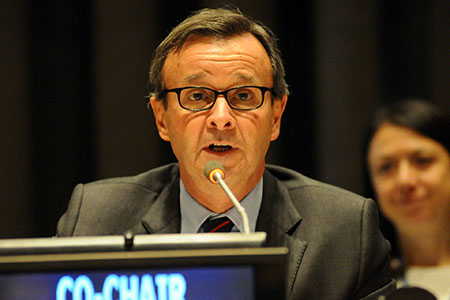
Sebastiano Cardi, Permanent Representative of Italy to the UN, said the SIDS Partnership Dialogue aims to galvanize voluntary commitments for the implementation of SDG 14.
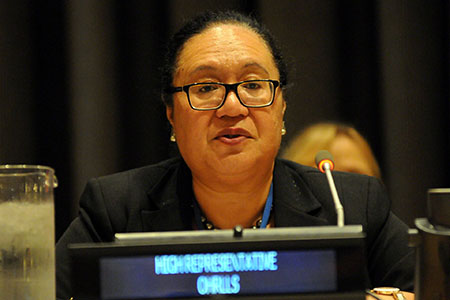
Fekitamoeloa Katoa ‘Utoikamanu, High Representative for the Least Developed Countries, Landlocked Developing Countries and Small Island Developing States (OHRLLS), highlighted several actions of her Office
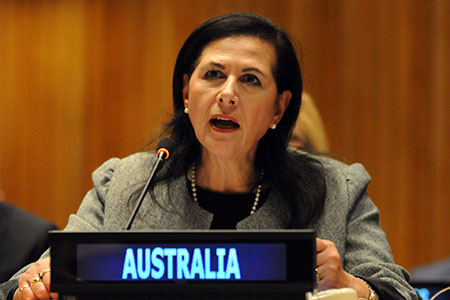
Concetta Fierravanti-Wells, Minister for International Development and Pacific, Australia, announced new financial commitments to SIDS
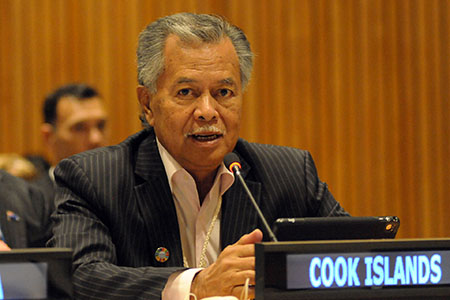
Henry Puna, Prime Minister, Cook Islands, stressed the need to create innovative mechanisms to finance conservation actions in SIDS.

Panel (L-R):
Fekitamoeloa Katoa ‘Utoikamanu, High Representative for the Least Developed Countries, Landlocked Developing Countries and Small Island Developing States (OHRLLS);
Wu Hongbo, Under-Secretary-General, DESA;
Sebastiano Cardi, Permanent Representative of Italy to the UN; and
Ahmed Sareer, Permanent Representative of Maldives to the UN.
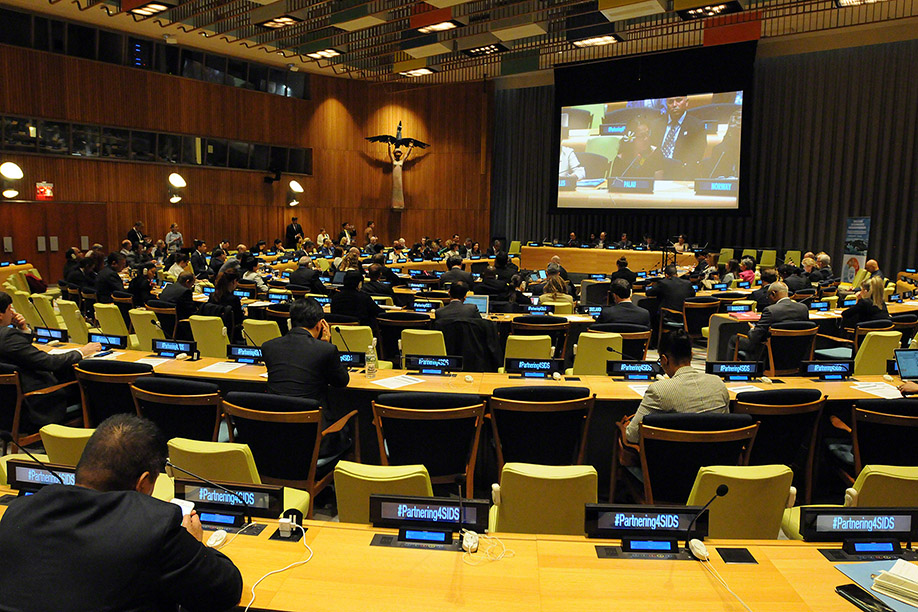
Contacts:
More Information:
Joining Hands to Help Achieve SDGs 6 and 14 – a Win-Win for Freshwater and Oceans
Presented by UN-Water, UN-Oceans and the Action Platform on Source-to-Sea Management (S2S Platform)
Federica Pietracci, Interim Secretary, UN-Water, chaired the event. Andrew Hudson, UNDP, reviewed close linkages between SDGs 6 and 14, concluding that their ambitious targets will require transformational change.
Habib El-Habr, UNEP, provided an overview of how the Global Programme of Action for the Protection of the Marine Environment from Land-based Activities (GPA) had been addressing land and ocean connections since 1995, highlighting the work of the Global Partnership on Marine Litter, Global Partnership on Nutrient Management and Global Wastewater Initiative.
Angela Cordeiro Ortigara, UN World Water Assessment Programme (WWAP) and UNESCO, noted that water demand is increasing annually, implying an increase in untreated wastewater production carried to the sea. She highlighted UN-Water work in improving monitoring and the recent UN-Water synthesis report on SDG 6 linkages to other SDGs.
A panel discussion was moderated by Torkil Clausen, Chair, S2S Platform. Gabriele Goettsche-Wanli, UN Office of Legal Affairs, discussed the work of UN-Oceans. She called for being mindful of, inter alia
: the need for vertical integration linking national, regional and global actions; and linkages between SDGs 6 and 14 and climate change.
Martha Rojas-Urrego, Secretary-General, Ramsar Convention on Wetlands, suggested that wetlands are a good lens for looking at the linkages between SDGs 6 and 14, and noted that the Wetlands Outlook due in 2018 will report on both inland and coastal wetlands.
Jack Moss, Executive Director, Aquafed, said if all wastewater was properly treated, a large portion of pollution would never reach the sea. He noted the difficulty of addressing diffuse pollution sources such as agricultural runoff.
Christine Valentin, CEO, World Ocean Council (WOC), said WOC is in the process of identifying the SDGs that impact businesses associated with oceans. She urged translating the SDGs into concrete targets the business community can understand and meet.
Maria van Berlekom, Swedish International Development Cooperation Agency (SIDA), spoke about various challenges, including siloed thinking and linking national and regional actions.
Birgitta Liss Lymer, UNDP-Stockholm International Water Institute (SIWI) Water Governance Facility and S2S Platform, underscored the need to identify incentives to the investments needed to address marine pollution’s root causes.
In her capacity as chair of the UN in-house dialogue on water, Katalin Annamária Bogyay, Permanent Representative of Hungary to the UN, invited more member states, researchers and other stakeholders to join the dialogue.
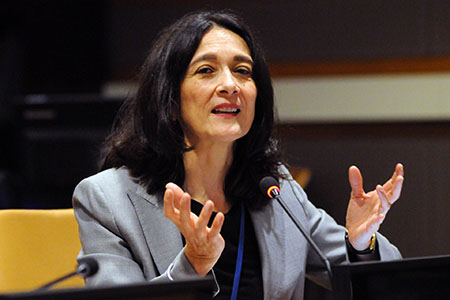
Martha Rojas-Urrego, Secretary-General, Ramsar Convention on Wetlands, suggested wetlands are a useful lens for dealing with the linkages between SDGs 6 and 14.
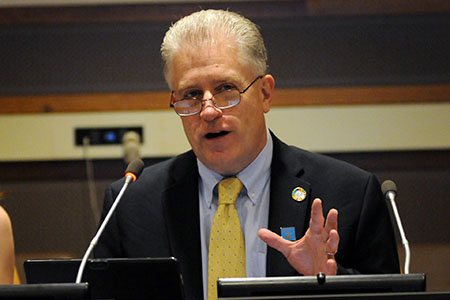
Andrew Hudson, UNDP, provided an overview of the linkages between SDGs 6 and 14.
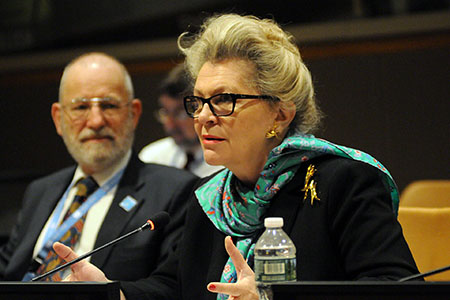
Ambassador Katalin Annamária Bogyay, Permanent Representative of Hungary to the UN, urged more parties to join the UN in-house dialogue on water.
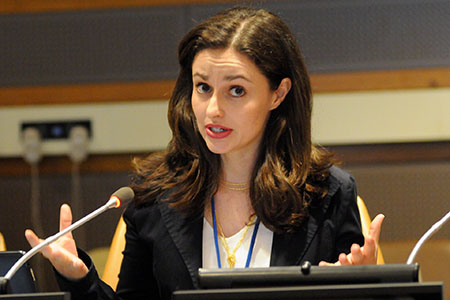
Angela Cordeiro Ortigara, UNESCO, discussed water quality monitoring and the 2017 Water Development Report, “Wastewater, The Untapped Resource.”

Panel (L-R):
Gabriele Goettsche-Wanli, UN Office of Legal Affairs;
Birgitta Liss Lymer, UNDP-Stockholm International Water Institute (SIWI) Water Governance Facility;
Maria van Berlekom, SIDA;
Martha Rojas-Urrego, Secretary-General, Ramsar Convention on Wetlands;
Habib El-Habr, UNEP; Angela Cordeir Ortigarao, UNESCO;
Andrew Hudson, UNDP; Federica Pietracci, Interim Secretary, UN-Water; and
Torkil Clausen, Chair, S2S Platform.
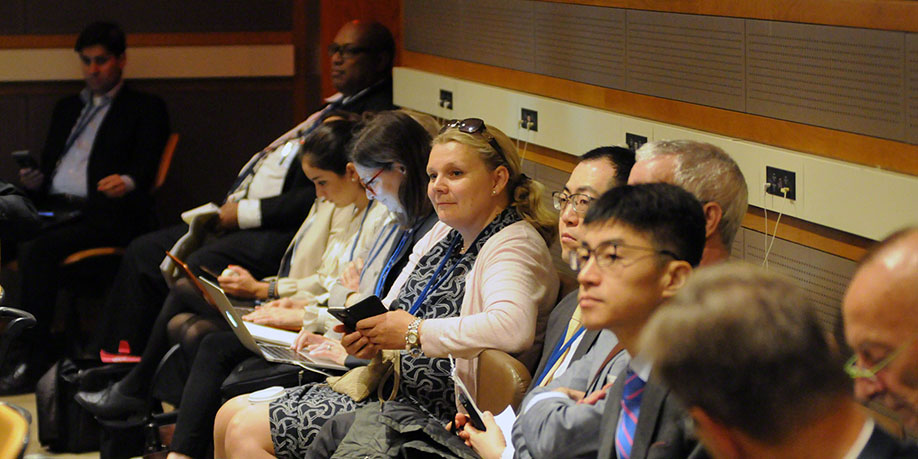
Contacts:
More Information:
Co-Designing Game-Changing Ocean Solutions for Sustainable Development
Presented by Conservation International
Moderator Aulani Wilhelm, Conservation International (CI), opened the event, welcoming participants to an “interactive session.”
Highlighting that approximately 50% of matter taken from the Ocean is said to be wasted, Ólafur Ragnar Grímsson, former President, Iceland, spoke on technical innovation from Iceland that has shown the enormous economic opportunities to reuse and enhance the commercial value of what comes from the Ocean. He described examples from his country, including Kerecis, a company that has developed a bandage made of fish skin that can heal wounds, which has recently been taken up by the US military.
Nishan Degnarain, World Bank, spoke on experiences from Mauritius, which has discovered large-scale economic opportunities around the Ocean since establishing a Ministry of Ocean Economy. He described innovative solutions that had been found to address issues such as illegal fishing, and spoke on a vision to develop an open access system to harness the aspiration of small islanders to create high-tech, sustainable fisheries.
Evan Rapoport, X - The Moonshot Factory, explained his company’s innovative approach to finding creative and radical solutions for problems. He explained the “moonshot culture,” which recognizes that real solutions are more likely to come from a group of people that embrace the process of finding innovations. He further explained that bonuses are awarded to employees when they discontinue a project as a recognition that running with a bad idea is an unhelpful approach, noting that 97% of ideas they float do not make it to the second phase of the project development process.
For the remainder of the session, participants brainstormed in small groups on radical project ideas for sustainable development issues, such as: solving hunger for 800 million people using a massive open online course; or solving ocean pollution of the food system using desalination. Rapoport stressed that the focus should be on the process of idea generation itself, rather than the actual output. Emerging “radical” ideas included: an autonomous car that would only drive to restaurants that used sustainably sourced food; and underwater internet that would enable young people to share underwater photos on social media to raise awareness on ocean conservation issues.
In the ensuing discussion, several participants said they had found the process a useful and “inspirational” eye-opener, and others suggested the need to harness the ideas coming from the Ocean Conference through developing a space where the knowledge is integrated to lead to a “real solutions” database.
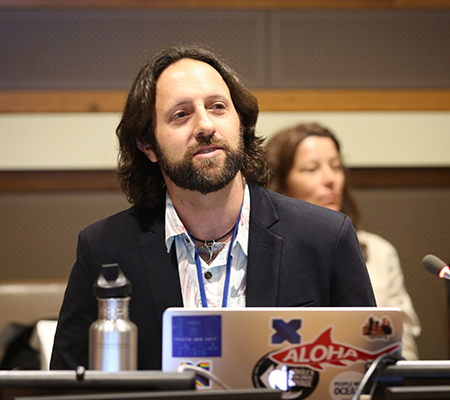
Evan Rapoport, X - The Moonshot Factory, said his organization looked for people that fell in love with problems rather than their solutions.
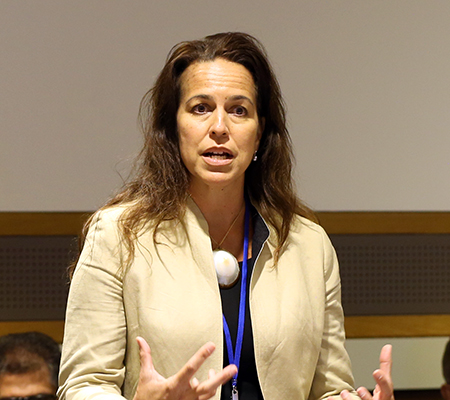
Aulani Wilhelm, CI, said her organization works to find global and local solutions to Ocean problems.
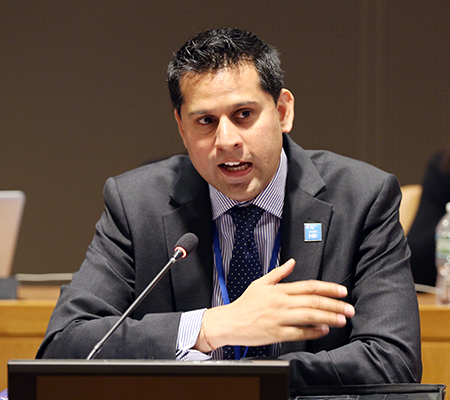
Nishan Degnarain, World Bank, spoke on experiences from Mauritius.
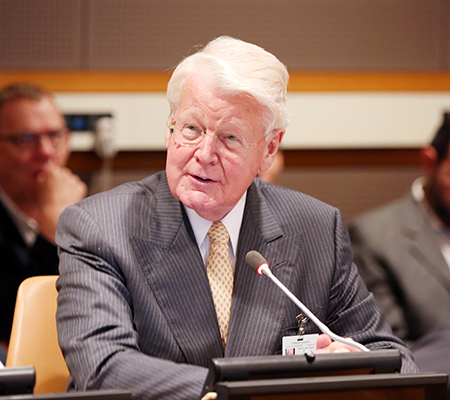
Ólafur Ragnar Grímsson, former President, Iceland, said his country’s recovery from the economic crisis was largely due to the commercial strength of the transformation of its fishing sector.
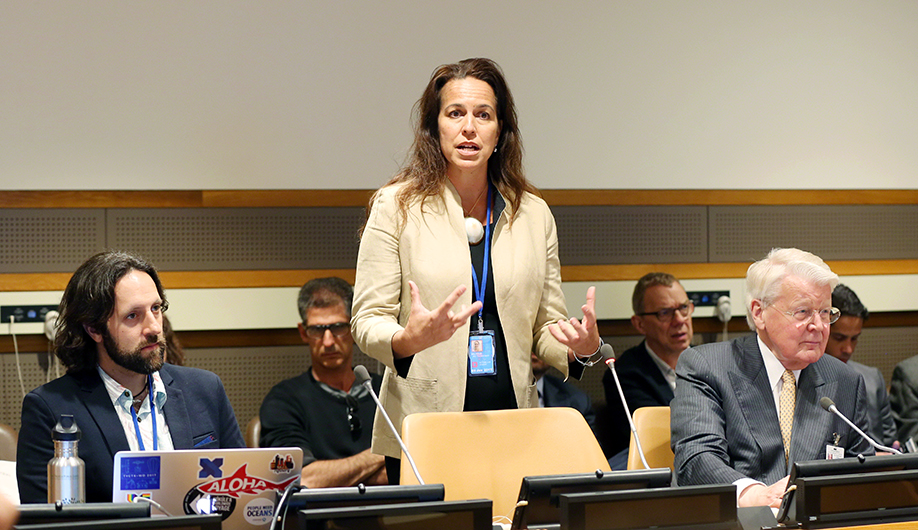
(L-R):
Evan Rapoport, X - The Moonshot Factory; Aulani Wilhelm, CI; and Ólafur Ragnar Grímsson, former President, Iceland.
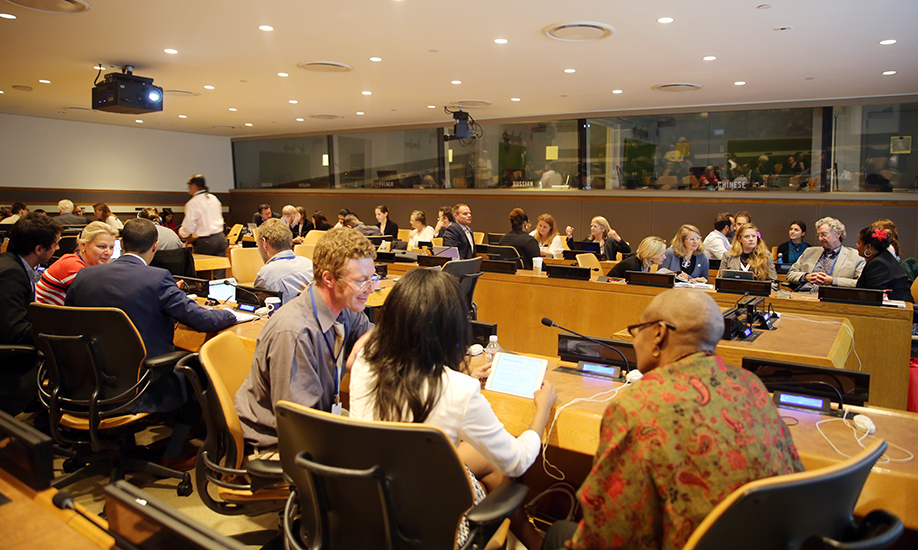
Contacts:
More Information:
Solutions to Combat Marine Litter
Presented by the Governments of Germany and Norway
This event, moderated by Lilian Busse, German Environment Agency, began with opening remarks from Jürgen Schulz, Permanent Mission of Germany to the UN. Explaining that a transition from theory to practice in terms of marine litter reduction may be possible, Schulz said the success of this transition would be “the benchmark on which we will be judged by future generations.”
Gunther Adler, State Secretary for the Environment, Nature Conservation, Building and Nuclear Safety, Germany, underlined the last two years as crucial for sustainable development, highlighting the adoption of the 2030 Agenda for Sustainable Development and G20 Action Plan to combat marine litter. He also stressed the work done regionally through the Convention for the Protection of the Marine Environment of the North-East Atlantic (OSPAR) and the HELCOM on that matter.
Tone Skogen, State Secretary, Ministry of Foreign Affairs, Norway, spoke about the impacts of plastic pollution on the Barents Sea and on the Artic sea ice. She announced the adoption of a white paper on the place of the oceans in Norwegian foreign and development policy and an associated programme on combating marine litter and microplastics
Steven Russell, American Chemistry Council, said marine litter poses an important issue for plastic manufacturers and who want to be part of the solution. He said the first thing to do was to invest in waste infrastructure management in countries where plastic use is currently exploding. He also mentioned: 65 commitments by trade associations to undertake action in their country; and a platform of plastic industry’s CEOs, committing to create common principles for recycling and waste management.
Afroz Shah, UN Environment’s Champion of the Earth 2016, spoke about an event in Mumbai, which led to the cleaning of a beach with the help of hundreds of volunteers. He presented a short film, “A Date with the Ocean,” and underlined that such actions can lead to a change of mindset and are complementary to and as effective as new regulation.
Erik Solheim, Executive Director, UNEP, stressed that every environmental problem has a solution and spoke of examples of success, including waste management in Rwanda and the work of the high-tech company Dell in reducing its packaging.
Helge Wendenburg, Ministry for the Environment, Germany, explained his country’s efforts to convince G20 countries to adopt the Action Plan to combat marine litter and finding concrete ways to make it effective.
In the ensuing discussion, participants discussed: how to replicate Germany’s and Norway’s efficient waste management policies; ways to channel financial organizations’ funds to key levels that bring broader industrial and compartmental changes; and the necessity to act every day to reduce plastic litter.
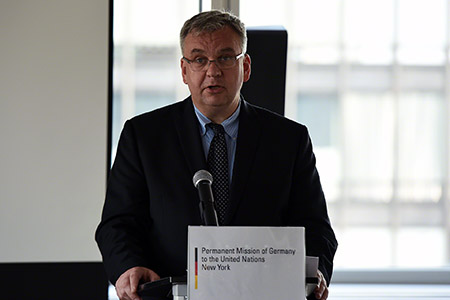
Jürgen Schulz, Permanent Mission of Germany to the UN, discussed ways to transition from theory to practice in the management of marine litter.
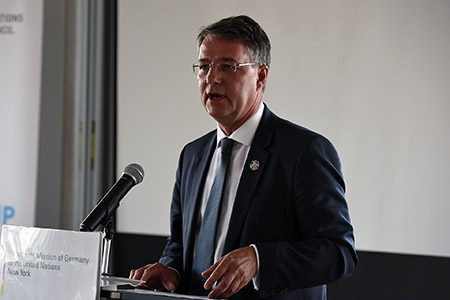
Gunther Adler, State Secretary for the Environment, Nature Conservation, Building and Nuclear Safety, Germany, highlighted the adoption by G20 countries of an Action Plan to combat marine litter.
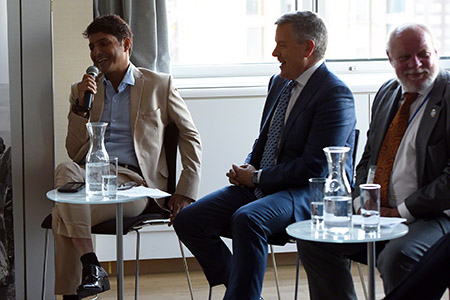
Afroz Shah, UNEP’s Champion of the Earth 2016, presented his work in engaging people to clean Mumbai’s beaches from litter.
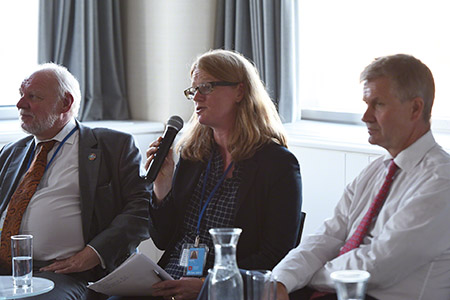
Lilian Busse, German Environment Agency, moderated the session.
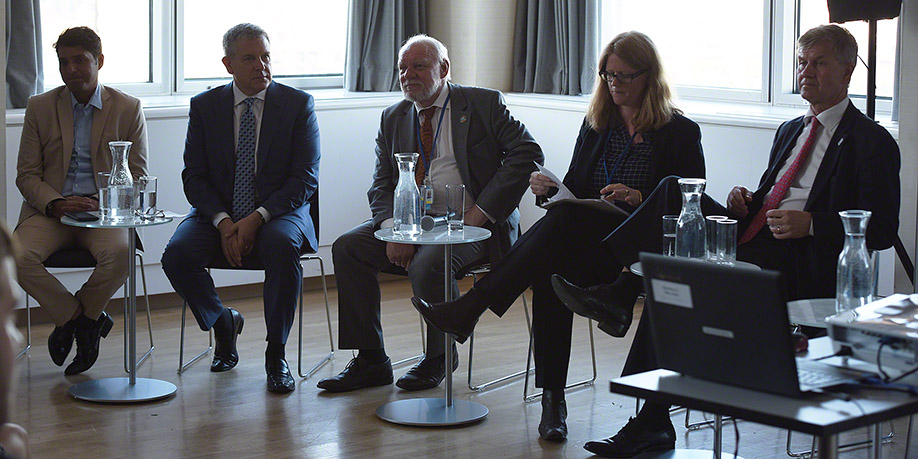
Panel (L-R):
Afroz Shah, lawyer, UNEP’s Champion of the Earth 2016;
Steven Russell, American Chemistry Council;
Helge Wendenburg, Ministry for the Environment, Nature Conservation, Building and Nuclear Safety, Germany;
Lilian Busse, Germany Environment Agency; and
Erik Solheim, Executive Director, UNEP.
